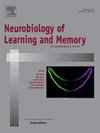The effect of post-learning rest on false memory
IF 1.8
4区 心理学
Q3 BEHAVIORAL SCIENCES
引用次数: 0
Abstract
Like sleep, a brief period of eyes-closed waking rest following encoding can improve memory. But in addition to quantitatively strengthening memory, sleep also qualitatively transforms memory. In one example of this effect, sleep has been reported to promote the formation of false memory, perhaps as a result of preferentially strengthening gist memory over memory for veridical detail. Here, we tested whether a period of eyes-closed waking rest, like sleep, affects the formation of false memories. We hypothesized that rest would increase false memory in the Deese-Roediger-McDermott (DRM) paradigm as measured by recall but would decrease false memory as measured by recognition. Following auditory encoding of 8 DRM word lists, N = 51 participants either sat quietly with their eyes closed for 15 min or spent an equivalent period completing a distractor task (within-subjects). Afterwards, participants completed a recall and recognition test. Despite being well-powered to detect effects of the magnitude previously reported in sleep studies, we did not detect any effect of rest on the formation of false memories, regardless of testing method. This may indicate that waking rest does not affect the formation of false memories in the same way that sleep does.
学习后休息对错误记忆的影响。
就像睡觉一样,编码后的短暂闭眼休息可以提高记忆力。但是除了从数量上加强记忆,睡眠也从质量上改变记忆。在这种效应的一个例子中,据报道,睡眠可以促进错误记忆的形成,这可能是由于优先加强要点记忆而不是真实细节的记忆。在这里,我们测试了一段闭眼的清醒休息是否会影响错误记忆的形成,就像睡觉一样。我们假设休息会增加用回忆来衡量的Deese-Roediger-McDermott (DRM)范式中的错误记忆,但会减少用识别来衡量的错误记忆。在对8个DRM单词列表进行听觉编码后,N = 51名参与者要么闭着眼睛安静地坐着15 分钟,要么花相同的时间完成一项分散注意力的任务(在受试者中)。之后,参与者完成了回忆和识别测试。尽管我们有能力检测到之前在睡眠研究中报道的影响程度,但无论采用何种测试方法,我们都没有发现休息对错误记忆形成的任何影响。这可能表明,清醒时的休息不会像睡眠那样影响错误记忆的形成。
本文章由计算机程序翻译,如有差异,请以英文原文为准。
求助全文
约1分钟内获得全文
求助全文
来源期刊
CiteScore
5.10
自引率
7.40%
发文量
77
审稿时长
12.6 weeks
期刊介绍:
Neurobiology of Learning and Memory publishes articles examining the neurobiological mechanisms underlying learning and memory at all levels of analysis ranging from molecular biology to synaptic and neural plasticity and behavior. We are especially interested in manuscripts that examine the neural circuits and molecular mechanisms underlying learning, memory and plasticity in both experimental animals and human subjects.

 求助内容:
求助内容: 应助结果提醒方式:
应助结果提醒方式:


